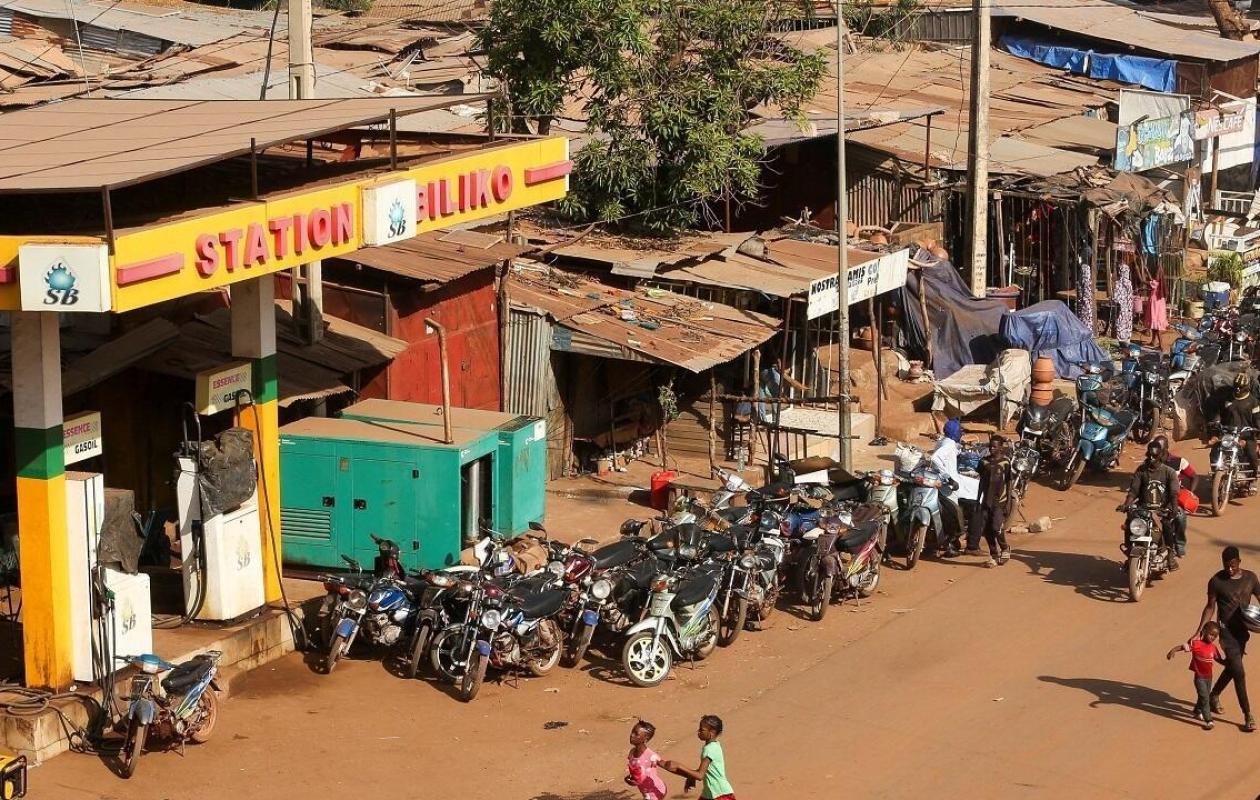
Mali : nette amélioration à Bamako de l'approvisionnement en carburant
Fuel supplies have improved significantly in Bamako in recent days, after several weeks of shortages due to JNIM jihadist attacks on convoys of tanker trucks supplying Mali, a landlocked country in West Africa.
By imposing a total blockade on several Malian cities from September onwards, and by attacking fuel convoys, the jihadists of the Group for the Support of Islam and Muslims (JNIM), affiliated with Al-Qaeda, suffocated the country's economy for several weeks, right up to its capital.
The arrival of fuel convoys escorted by the army and Russian mercenaries has brought a lull to the fighting in Bamako, although sources suggest that a truce with JNIM is about to expire.
The endless queues at petrol stations to which Bamako residents had become accustomed at the height of the crisis have disappeared from the capital's landscape in recent days.
"I can't believe it. Here, the queue stretched for at least two kilometers. But here, I was served in a few minutes," rejoiced a motorist in the capital, speaking to AFP on Friday under the condition of anonymity due to the security context.
Traffic had almost returned to normal on Friday, although some stations closed since the beginning of the crisis have not yet reopened, AFP journalists observed.
- Military escorts -
"We hope that the problem is solved once and for all. But I continue to fill up whenever I have the opportunity because I am still not very reassured," testified another Bamako resident.
However, electricity coverage remains very limited compared to before the crisis. Most neighborhoods receive power for about six hours a day, sometimes less.
This lull is made possible by the arrival of fuel convoys in Bamako, escorted by the army and Russian paramilitaries of the Africa Corps and under aerial surveillance.
Malian authorities widely publicized the arrival from Niger of 82 tankers escorted by the Nigerien army. Niger is an ally of the ruling junta in Bamako within the Alliance of Sahel States (AES), alongside Burkina Faso. These three countries are led by sovereignist juntas.
"This mechanism will ensure the correct and regular supply of Mali," a member of the government told AFP.
The government has also signed an agreement with importers of petroleum products to expedite customs and administrative procedures.
"These entries also coincide with a certain inactivity of the JNIM against the tankers and a large-scale special military operation launched by the army which is combing the entire area," a security source points out.
"The question is whether this escort strategy, which is extremely costly in terms of resources, is viable in the long term," the same source wonders.
- Unofficial truce -
However, some sources cite the existence of an unofficial truce between the jihadists and the government, which explains the lull felt in the capital.
"The government has signed a truce with the jihadists," says a member of the National Transitional Council (NTC), the legislative body of the ruling military.
This arrangement, negotiated a month ago when JNIM released an Emirati hostage for a record sum of $50 million, is however about to expire.
In anticipation of the end of this truce, which has never been recognised by the authorities, the jihadists announced last week that they would intensify their actions.
"We are worried. The truce negotiated between the jihadists and the government allowed this resumption, but we are learning that this truce is coming to an end," an elected official from the Sikasso region (southeast) told AFP.
"If necessary, we will sign about twenty truces if it is useful for the happiness of our people," the CNT member told AFP.
Humanitarian flights, which were interrupted at the height of the crisis due to a lack of fuel, have resumed about three times a week "to the northern and central regions," a source within an NGO told AFP.
The situation remains difficult in the rest of the country, where several localities in the south and center are under jihadist blockade and fuel convoys are slow to arrive.
In Sikasso (southeast), which had been relatively spared in recent weeks, "the situation has worsened," testifies a resident.
"Yesterday (Thursday) night, only four stations were serving fuel, creating long queues. We have the impression that everything has been driven to Bamako," he continued.
In Ségou and Mopti (central region), fuel rationing is still practiced.
A resident of Mopti contacted by AFP stated that "since September, no station has been supplied." "We have no electricity and water problems have been added to all of this," he said.
"Mali is not limited to Bamako," he fumes.
Commentaires (5)
La France et ses médias !!!
Les francais aime tellement Les Maliens qu' ils souffrent a notre place , de la penurie du carburant.
Mais au finish, La France et ses amis terroristes, vous n avez pas de pays ?
Participer à la Discussion
Règles de la communauté :
💡 Astuce : Utilisez des emojis depuis votre téléphone ou le module emoji ci-dessous. Cliquez sur GIF pour ajouter un GIF animé. Collez un lien X/Twitter, TikTok ou Instagram pour l'afficher automatiquement.